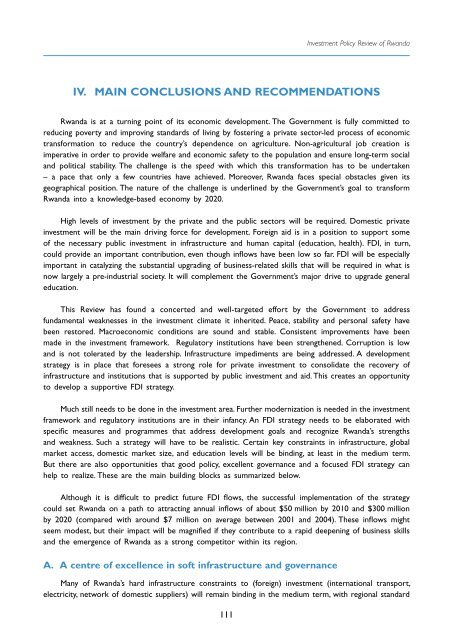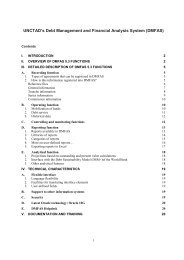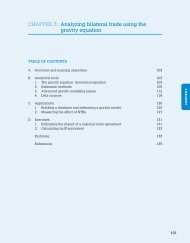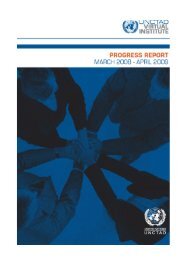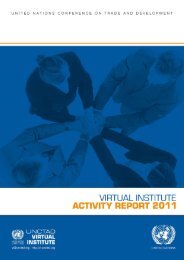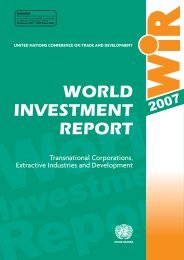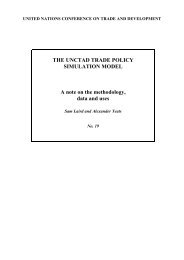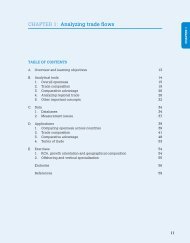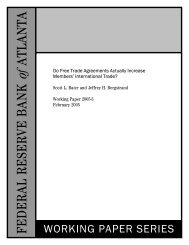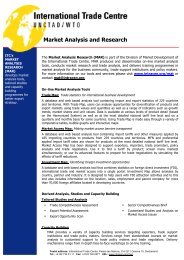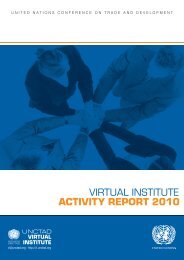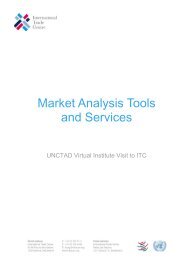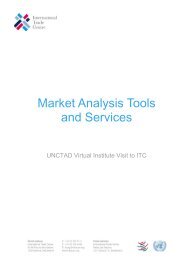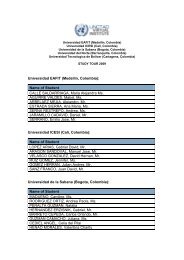Investment Policy Review - Rwanda - UNCTAD Virtual Institute
Investment Policy Review - Rwanda - UNCTAD Virtual Institute
Investment Policy Review - Rwanda - UNCTAD Virtual Institute
Create successful ePaper yourself
Turn your PDF publications into a flip-book with our unique Google optimized e-Paper software.
<strong>Investment</strong> <strong>Policy</strong> <strong>Review</strong> of <strong>Rwanda</strong><br />
IV. MAIN CONCLUSIONS AND RECOMMENDATIONS<br />
<strong>Rwanda</strong> is at a turning point of its economic development. The Government is fully committed to<br />
reducing poverty and improving standards of living by fostering a private sector-led process of economic<br />
transformation to reduce the country’s dependence on agriculture. Non-agricultural job creation is<br />
imperative in order to provide welfare and economic safety to the population and ensure long-term social<br />
and political stability. The challenge is the speed with which this transformation has to be undertaken<br />
– a pace that only a few countries have achieved. Moreover, <strong>Rwanda</strong> faces special obstacles given its<br />
geographical position. The nature of the challenge is underlined by the Government’s goal to transform<br />
<strong>Rwanda</strong> into a knowledge-based economy by 2020.<br />
High levels of investment by the private and the public sectors will be required. Domestic private<br />
investment will be the main driving force for development. Foreign aid is in a position to support some<br />
of the necessary public investment in infrastructure and human capital (education, health). FDI, in turn,<br />
could provide an important contribution, even though inflows have been low so far. FDI will be especially<br />
important in catalyzing the substantial upgrading of business-related skills that will be required in what is<br />
now largely a pre-industrial society. It will complement the Government’s major drive to upgrade general<br />
education.<br />
This <strong>Review</strong> has found a concerted and well-targeted effort by the Government to address<br />
fundamental weaknesses in the investment climate it inherited. Peace, stability and personal safety have<br />
been restored. Macroeconomic conditions are sound and stable. Consistent improvements have been<br />
made in the investment framework. Regulatory institutions have been strengthened. Corruption is low<br />
and is not tolerated by the leadership. Infrastructure impediments are being addressed. A development<br />
strategy is in place that foresees a strong role for private investment to consolidate the recovery of<br />
infrastructure and institutions that is supported by public investment and aid. This creates an opportunity<br />
to develop a supportive FDI strategy.<br />
Much still needs to be done in the investment area. Further modernization is needed in the investment<br />
framework and regulatory institutions are in their infancy. An FDI strategy needs to be elaborated with<br />
specific measures and programmes that address development goals and recognize <strong>Rwanda</strong>’s strengths<br />
and weakness. Such a strategy will have to be realistic. Certain key constraints in infrastructure, global<br />
market access, domestic market size, and education levels will be binding, at least in the medium term.<br />
But there are also opportunities that good policy, excellent governance and a focused FDI strategy can<br />
help to realize. These are the main building blocks as summarized below.<br />
Although it is difficult to predict future FDI flows, the successful implementation of the strategy<br />
could set <strong>Rwanda</strong> on a path to attracting annual inflows of about $50 million by 2010 and $300 million<br />
by 2020 (compared with around $7 million on average between 2001 and 2004). These inflows might<br />
seem modest, but their impact will be magnified if they contribute to a rapid deepening of business skills<br />
and the emergence of <strong>Rwanda</strong> as a strong competitor within its region.<br />
A. A centre of excellence in soft infrastructure and governance<br />
Many of <strong>Rwanda</strong>’s hard infrastructure constraints to (foreign) investment (international transport,<br />
electricity, network of domestic suppliers) will remain binding in the medium term, with regional standard<br />
111


